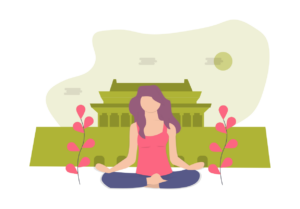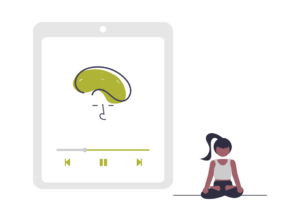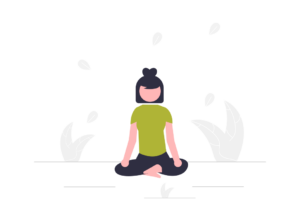
How Many People Meditate in the World? – 25 Global Meditation Statistics 2022
It’s World Meditation Day tomorrow, so we decided to take a deep dive into the most recent and interesting statistics and of course the benefits of meditation to honour this momentous day.
How many people are meditating?
- There are an estimated 200-500 million meditators worldwide. With 7.9 billion people in the world, of that 74.5% which equates to 58.9 billion are aged 15 and over. Considering this age range, it accounts for 3.4 – 8.5% of the global population who currently meditate.
- This number most likely includes a sharp increase in the past two years due to the pandemic. Meditation apps were the most accessible form of mental health support during the COVID-19 pandemic. As a result, there was a surge in app downloads during this period, however, the trend was building before. Meditation apps Calm and Headspace are now individually worth billions of dollars, more on the meditation app market later.
- A report from the CDC found that more than 14% of American adults said they had meditated in the past 12 months in 2017, this was three times as many as they found when conducting the same survey in 2012.
- 7% of children in the US meditate. In 2012, the percentage was only 1.6%.
- A 2020 survey of 1,013 adults in Britain found that 15% practice meditation.
Market size
- The Global Wellness Institute reports the market size of meditation and mindfulness was valued at $3.5 billion in 2020 with a growth rate of 25.4% since 2017-2019. This growth is most likely due to the pandemic.
- The Global Wellness Institute reports the market size of meditation and mindfulness was valued at $3.5 billion in 2020 with a growth rate of 25.4% since 2017-2019. This growth is most likely due to the pandemic.

- The meditation market is expected to reach $9 billion by 2027.
Where in the world is meditation popular?
- A search on Google Trends reveals that Ireland and Australia hold the first spot in countries that have searched for the term meditation the most in the last 12 months.
- The top 8 countries where meditation is most popular are India, Japan, Indonesia, Tibet, Thailand, China, Korea and Myanmar. These countries are not only steeped with traditional meditation history and practices, but they also offer plenty of retreats where meditation and self-awareness practices can be learnt by seekers.
Meditation in the workplace
- A study conducted at the University of Washington found that those who had meditation training in the workplace were able to stay on task longer and were less distracted. Meditation also improved memory and alleviated stress in those that participated in the study.
- Transport for London introduced a stress management course which included meditation techniques. The company found that absenteeism caused by stress, anxiety and depression dropped by 71%. 84% of participants said they were relating to others better. 82% saw an increase in the amount of exercise they did. 77% said they saw an improvement in their diet or tackled drinking/smoking problems. 54% saw an improvement in their sleeping patterns.
- A National Business Group on Health (NBGH) survey reported that 52% of employers offered mindfulness training to employees in 2018. This is a rise over 2017 when it was 36%.
Benefits of meditation
- A ScienceDirect study showed that you can increase your attention span simply by practicing meditation for only four days.
- Meditation can reduce the wake time of insomniacs by 50%.
- A study revealed that the effects of meditation can improve conditions such as hypertension, type 2 diabetes mellitus and high cortisol levels.
- Studies in people with age-related memory loss have shown meditation improves performance on neuropsychological tests.
- A study revealed the reasons why people meditate: for general wellness 76%, improving energy 60%, concentration 50%, anxiety 29% and depression 18%. From this data, 65% of individuals confirmed that meditation improved the most important reason they were using it for a great deal.
- Another study revealed that 84% of people meditate to reduce stress and anxiety.
Most popular types of meditation
Transcendental Meditation became popular in the 70’s and has continued to grow in following. There was an estimated one million Transcendental Meditators by the 1980’s.
- Lately it has been reported that more than 10 million people have learnt how to practice it.
So, what is Transcendental Meditation exactly? It is a form of silent mantra meditation practised twice daily for 20 minutes. The mantra is unique to each person and is given by and the process taught by a certified practitioner.
Of course, there is no reason why you cannot practice mantra meditation by choosing your own mantra and reciting it. It could simply be a powerful word or phrase that resonates with you and that you want to instil into your consciousness over time.
Another popular type of meditation is mindfulness or focus meditation. This is when you are aware of the present moment and acknowledge all thoughts, sounds and feelings without getting distracted by them. If you find yourself getting distracted, you just gently ease yourself back to the present moment. Some people use their breath as a focus point during the entire meditation and keep their awareness solely on the breath.
 Guided meditation is another popular type of meditation and involves someone guiding you through the meditation either in person or over audio orvideo. You simply follow their instructions through the process, so if you prefer structure then this may be a good option for you.
Guided meditation is another popular type of meditation and involves someone guiding you through the meditation either in person or over audio orvideo. You simply follow their instructions through the process, so if you prefer structure then this may be a good option for you.
Benefits of meditating every day
There are many studies which provide evidence of the benefits of meditation on both your physical and mental health. Among these benefits are managing stress and anxiety, increasing patience, lowering your heart rate and blood pressure, improving sleep, elevating mood and so much more.
Chronic stress is known to weaken the immune system and accelerate ageing, so meditation can reduce how often you get sick and help you look younger for longer! When you reduce stress chemicals such as cortisol and adrenaline, they are replaced by bliss chemicals such as dopamine and serotonin.
By increasing patience, you naturally get on with people better and develop deeper relationships. You also think more clearly, make better decisions, and become more engaged in life, since your prefrontal cortex is activated increasing alpha brain waves. Meditation helps to develop full brain functioning.
This enhances the creative functions in the brain, which leads to better problem solving and more innovative ideas coming through. Overall, as a meditator you will become a much more capable human being.
- And it doesn’t have to take long to start reaping the benefits either, a meta-analysis of mindfulness meditation has shown it can have profound physical effects on the brain in just eight weeks.
Your brain can become a higher functioning kit by the phenomenon of neuroplasticity, which is the ability of the brain’s neurons and neural networks to change their connections and behaviour in response to new information and stimulation.
Getting started with meditation
Whether you choose to seek out a meditation instructor, download an app, read a book, or figure it out on your own. It is a technique that can offer many mental and physical benefits. The only way to really understand this, is by making a commitment to meditate for at least a few months. You will then be in a much better position to understand if it’s right for you or not.
Regarding when you should practice, there is no right or wrong time. Fit it into your schedule when you have space and are less likely to be distracted. Most people choose to meditate either first thing in the morning, or last thing at night (or both), since it’s a beneficial way to start the day and it can also help you to unwind and clear your mind for sleep.
There is also no right or wrong answer to how often you should meditate but getting into a regular routine daily at a set time can be helpful in turning it into a long-term habit that you will stick with.
With a daily practice of 10 to 20 minutes, you should see positive results from within a few weeks to a couple of months. If you feel like meditating for longer than that, then great, you may see results sooner. You can’t really meditate too much!
Most popular meditation apps
- Calm and Headspace are two of the most popular meditation apps globally, accounting for approximately 70% of the market share.

- Revenue in the Meditation Apps segment is projected to reach$1.25 billion in 2022. The global Mindfulness Meditation Apps Market was valued at $1.1 billion in 2021 and it is estimated to be valued over $6.8 billion by 2030.
- The top 10 most popular meditation apps generated $195 million in sales in 2019.
- Headspace has been downloaded over 65 million times and has over 2 million subscribers. Calm surpassed 100 million downloads in 2021 to become the most downloaded meditation app.
- The search for yoga and meditation apps has grown by 65% between 2019 and 2020 as more young consumers seek virtual resources to manage their stress and anxiety.
Well known meditation proponents
Meditation has been made even more popular by its high-profile followers across all sectors. From talk show hosts such as Oprah Winfrey and Ellen DeGeneres. Sporting legends such as Lebron James and Novak Djokovic. To singer songwriters such as Madonna and Lady Gaga. From Hollywood actors such Hugh Jackman and Eva Mendes to leading entrepreneurs and CEOs like Steve Jobs and Jeff Weiner.
Meditation is for everyone, practising it regularly can quite literally change your life. Once you start reaping the benefits, you might just wonder how you got through life without it!


